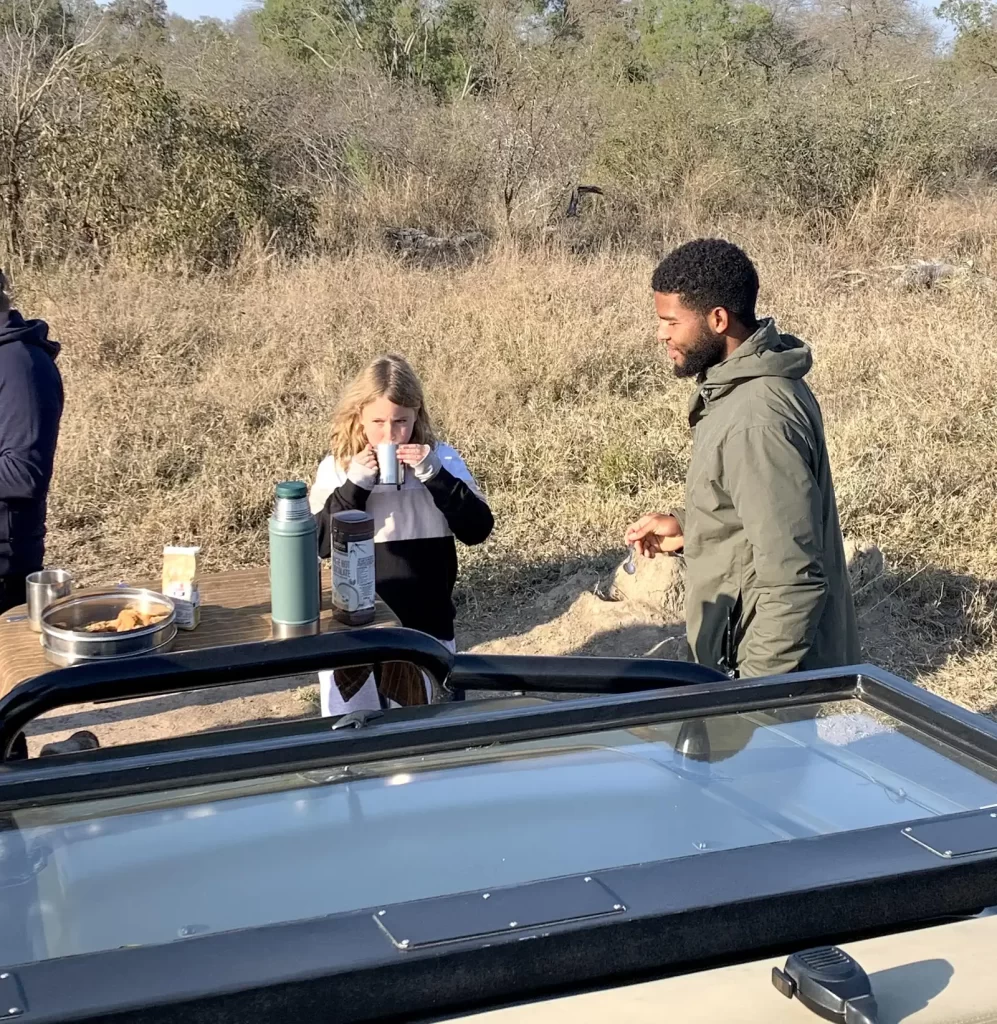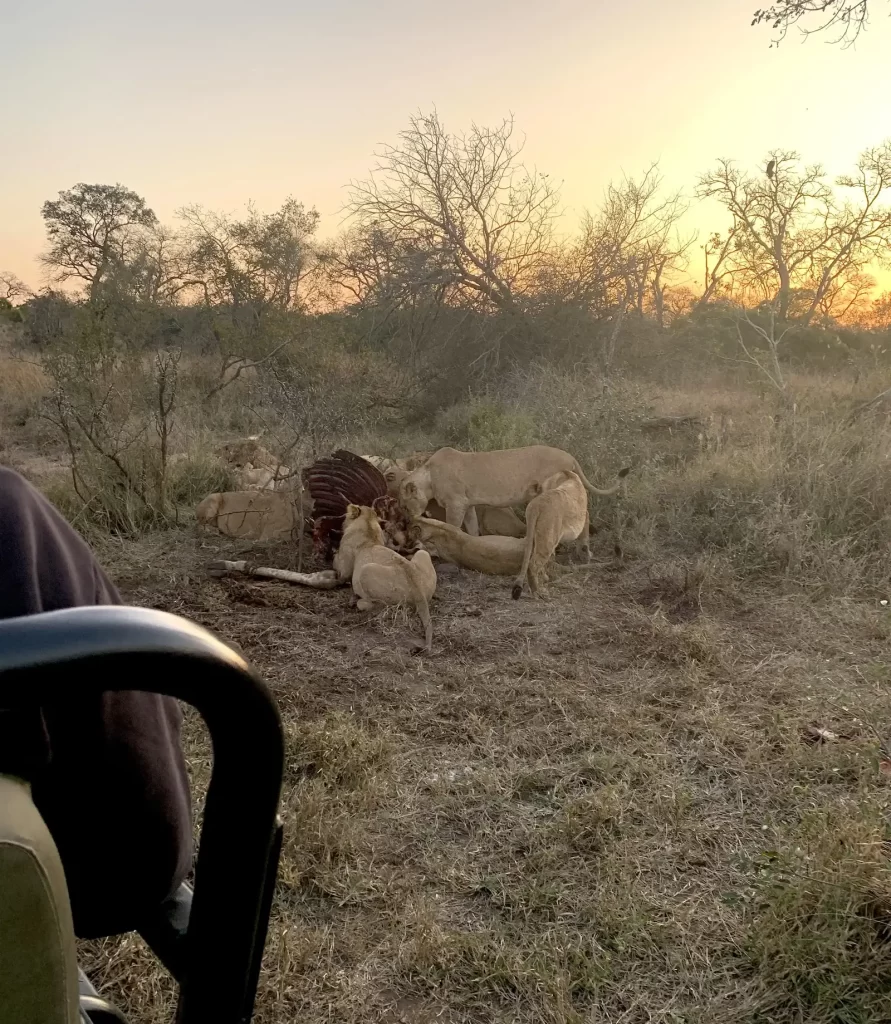I celebrated an important birthday recently.(not saying which birthday, but be assured of my many years of experience in southern Africa tourism!)
I do not usually make a fuss of my own birthdays, but decided this one was important. So close family arrived from Johannesburg, Cape Town and Sydney, and we all ventured off to an exclusive use safari camp in the greater Kruger Park. Its winter – surely the best months for a safari in South Africa. The Eastern and Northern regions of South Africa have very pleasant winters; sunny days, with day time temperatures around 27C.We even swam in the pool. But for early morning game drives and night safaris, be warned – dress warmly. For more details on how game drives are planned check out.
We booked a small camp in the Thornybush Game Reserve for 3 nights – just us, an excellent guide and tracker, and our own 10 seater open safari vehicle. With a chef that prepared delectable dishes, and housekeepers who ensured our tents where kept tidy – we were spoiled.

Thornybush Game Reserve is part of the greater Kruger National Park, a vast wildlife haven that includes being part of the Great Limpopo Transfrontier Park (GLTP).
This vast Transfrontier area was proclaimed in 2022, with the signing of an international treaty at Xai-Xai, Mozambique by the heads of state of Mozambique, South Africa and Zimbabwe.
The Great Limpopo Transfrontier Park straddles the borders of Mozambique, South Africa and Zimbabwe and joins some of the most established wildlife areas in Southern Africa into a huge conservation area of 35 000km² (± the size of the Netherlands) which is managed as an integrated unit across three international borders, Limpopo National Park (LNP) and forms the core of the second-phase transfrontier conservation area (TFCA), measuring almost 100 000km² and which includes Banhine and Zinave national parks, the Massingir and Corumana areas and interlinking regions in Mozambique, as well as various privately (Sabi sands, Thornybush, Timbavati, Klaserie and Balule Reserve) and state-owned conservation (Kruger Park) areas in South Africa and Zimbabwe bordering on the Transfrontier Park.
The greater Kruger National Park and the surrounding private game reserve is one of the largest game reserve areas in southern Africa.
The greater Kruger National Park is a popular tourist destination, attracting visitors from all over the world. It is known for its stunning landscapes, diverse wildlife, and conservation efforts.
The greater Kruger Park is home to a wide variety of wildlife, including the famous Big Five – lions, elephants, buffaloes, leopards, and rhino. Other species found in the park include giraffes, zebras, hippos, crocodiles, and a wide variety of bird species.

Visitors to this safari haven can enjoy game drives, guided bush walks, and bird-watching activities. On our 3 night safari to Thornybush, we saw so much game; lions on a kill, elephants coming down to drink and play in the dam in front of the lodge, all the plains game like zebra, waterbuck, kuku, impala, and wildebeest. We were spoiled with leopard sightings; a female up a tree with an impala kill, a big male walking alongside the vehicle stopping to scent mark his territory and another smaller female leopard stalking on an unsuccessful hunt of impala.
Perhaps one of the most treasured moments was when a white rhino and her calf walking right past us whilst we stopped for a cup of coffee on the early morning game drive. She evidently trusted us and it was amazing to watch her and her youngster amble on past us.
Many lodge operators have invested considerably in social responsibility programmes, taking seriously their commitment to uplift disadvantaged communities that surround wildlife parks. It is only with involving and educating local communities that future generations will understand and appreciate the need to value and protect wildlife areas.
Thornybush’s dedication to sustainability and conservation reflects the industry’s shift towards conscious, impactful travel experiences. Travellers are seeking experiences that are meaningful, responsible, and conscious of the environment and as a result Thornybush have committed themselves to embrace the journey of being a company that is overtly responsible in all their operations, so they can continue to look after their staff, the environment and local communities that surround their lodges.
The inception of Thornybush Community in 2005 marked a pivotal moment. This registered non-profit organisation was conceived to empower and uplift the neighbouring communities like Uthla, Dixie, and Acornhoek. Supporting schools, community gardens, and kids in conservation initiatives, Thornybush is activity involved in the communities from which their rangers and hospitality staff are from – inspiring a new generation to value our natural world.
The winter period (June,July,August) are the best months for a safari in South Africa. If you, like me, are celebrating a milestone event, or you are looking for a great South Africa safari experience for your family and friends, talk to us today.
We had the best time – excellent game viewing, dinners around a crackling fire, comfy beds, watching game come to drink at the camp waterhole, and going to sleep lulled by the sounds of the African night. (think hearing the rustling of buffalo moving through the bush, the whooping calls of a hyena or the scops owl calling to a mate)
Whether you prefer a luxury lodge or classic safari camp, there is a private game lodge in the greater Kruger Park to suit your preferences and create unforgettable memories.



